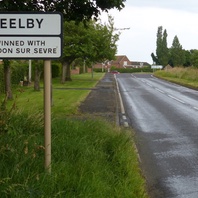
Viking Names
Keelby
Keelby, in the Yarborough Wapentake of Lincolnshire, is a Old Norse compound coming from kjǫlr ‘a keel, a ridge (of hills)’ and by ‘farmstead, village’. The village is situated on a rising piece of ground between 15 and 20 metre contours (one small patch above 20 metres). This forms a distinct elongated ‘ridge’ running south-east-north-west.
Read More
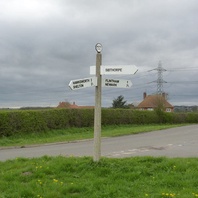
Viking Names
Sibthorpe
Sibthorpe, in the Newark Wapentake of Nottinghamshire, comes from either the Old English male personal name Sibba or the Old Norse male personal name Sibbi and Old Norse þorp ‘a secondary settlement, a dependent outlying farmstead or hamlet’.
Read More

Viking Names
Tumby
Tumby, in the Gartree Wapentake of Lincolnshire, is a difficult name. The first element may be the Old Norse male personal name Tumi, a name which occurs in several Swedish and Danish runic inscriptions. Alternatively the first element could be Old Norse tún ‘an enclosure, a farmstead’. The second element is bý ‘a farmstead, a village’.
Read More
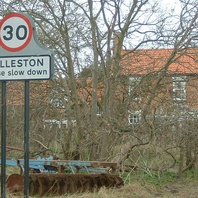
Viking Names
Rolleston
Rolleston, in the Thurgarton Wapentake of Nottinghamshire, comes from the Old Norse male personal name Hróaldr and the Old English element tun ‘farm, settlement’. It is thus a hybrid name like others nearby, such as Gonalston.
Read More
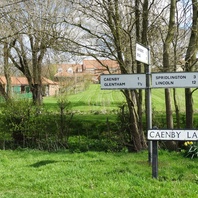
Viking Names
Caenby
Caenby, in the Aslacoe Wapentake of Lincolnshire. likely comes from the otherwise unrecorded Old Norse male byname Kafni (probably originally a byname) and the Old Norse element bý ‘a farmstead, a village’,
Read More
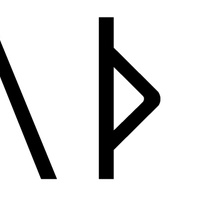
Viking Names
Modir
The Old Norse female name Móðir is found in Motherby, Cumberland, and has been suggested as the first element in Moodersley, a minor name in Kedleston, Appletree Hundred, Derbyshire. The name Kedleston itself includes the male personal name Ketill. Móðir means literally ‘mother’ and the use of family terms as personal names (compare the use of ‘Sonny’ in English), while not frequent, is attested in Scandinavia.
Read More
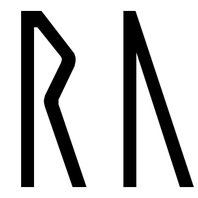
Viking Names
Skroppa
Skroppa is not recorded outside the sagas of the Icelanders but has been postulated as a female personal name which forms the first element of Scrooby, Nottinghamshire. In the Saga of Hord, Skroppa is a sorceress who uses illusion and shapechanging.
Read More
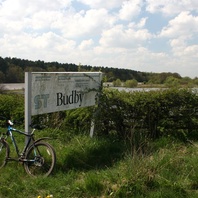
Viking Names
Budby
Budby, in the Bassetlaw Wapentake of Nottinghamshire, likely comes from the Old Norse male personal name Butti (or possibly Botti)and the Old Norse element bý ‘farm, settlement’. Budby is a joint parish with Perlethorpe.
Read More
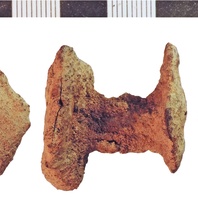
Viking Objects
Clench Nail (NLM-2FC690)
Clench nails were used in clinker-style ship-building from the 7th century to the 15th and also for domestic purposes, in which clench nails might appear where ship timber has been reused. Clinker ship-building involved building the ship’s hull first out of layered planks attached to the keel and held together using clench nails. Clinker-built boats and ships are particularly associated with the Vikings.
Read More
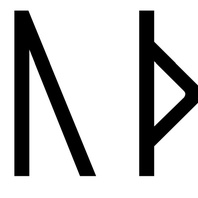
Viking Names
Gyda
Gyða appears early in Norway and is frequent there but it is not as common in Iceland. It appears in two Danish runic inscriptions and is common in other Danish sources. The name also appears in a few Swedish runic inscriptions and is found in later Swedish sources. Gyða is also attested in medieval documents from Lincolnshire and Domesday Book for Yorkshire. The name is a pet form of Gyríðr and it has been suggested that it was borrowed from England because several of the oldest carriers of the name appear to be of mixed Nordic and English origin.
Read More

Viking Names
Snarford
Snarford, in the Lawress Wapentake of Lincolnshire, is an Anglo-Scandinavian hybrid from the genitive singular form of the Old Norse male personal name Snǫrtr, i.e. Snartar, and Old English ford ‘a ford’. The ford crossed Barlings Eau and Snarford may have been situated on an ancient line of communication between Lincoln and the Wolds.
